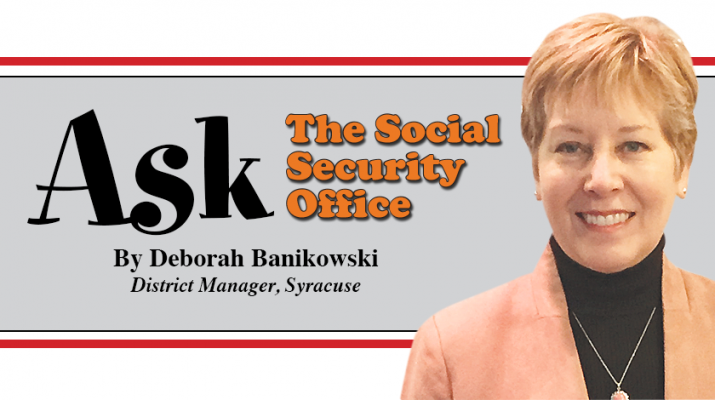Did you know, you can do much of your business online with Social Security? This means no need to call or visit a local Social Security office. You can take your time completing our online applications and even save your progress to return to later.
You can apply online for:
• Retirement or Spouse’s Benefits – You can apply up to four months before you want your retirement benefits to start. You must be at least age 62 for the entire month to be eligible to receive benefits. If you were born on the first or second day of the month, you meet this requirement in the month of your 62nd birthday. If you were born on any other day of the month, you do not meet this requirement until the following month. When you’re ready, apply at www.ssa.gov/retireonline.
• Disability Benefits – You can use our online application, available at www.ssa.gov/disabilityonline, to apply for disability benefits if you:
– Are age 18 or older;
– Are not currently receiving benefits on your own Social Security record;
– Are unable to work because of a medical condition expected to last at least 12 months or result in death; and
– Have not been denied disability benefits in the last 60 days. If your application was recently denied, our online appeal application is a starting point to request a review of the determination we made. Please visit www.ssa.gov/benefits/disability/appeal.html.
• Supplemental Security Income (SSI) – SSI provides monthly payments to adults and children with a disability or blindness who have income and resources below specific financial limits. SSI also makes payments to people who are age 65 and older without disabilities who meet the financial qualifications. If you plan to apply for SSI, you can tell us you want to apply and we will make an appointment to help you complete the application. Or you can complete a large part of your application online at www.ssa.gov/benefits/ssi.
• Medicare – Medicare is a federal health insurance program for people age 65 or older, some people younger than 65 who have disabilities, and people with end-stage renal disease. If you are not already receiving Social Security benefits, and are not working, you should apply for Medicare three months before turning age 65 at www.ssa.gov/medicare.
• Extra Help with Medicare Prescription Drug Costs – Some people with limited resources and income may be able to get Extra Help paying their monthly premiums, annual deductibles, and prescription co-payments related to a Medicare prescription drug plan. People who need assistance with the cost of medications can apply for Extra Help at www.ssa.gov/i1020.
Please share these helpful resources with your friends and family.
Q&A
Q: My child receives SSI. He will be 18 in a few months. Will his SSI payments continue after he turns 18?
A: When a child who is on SSI turns 18, we conduct both a medical and a non-medical review to see if they are still eligible for SSI payments. If the child continues to meet the income and resource requirements, and is still considered to be disabled under the adult disability rules, then payment continues. For more information, read What You Need to Know About Your Supplemental Security Income (SSI) When You Turn 18 at www.ssa.gov/pubs.
Q: How do I report a change of address if I’m getting Supplemental Security Income (SSI)?
A: A person receiving SSI must report any change of address by calling our toll-free number, 1-800-772-1213 (TTY 1-800-325-0778), or by visiting a local office within 10 days after the month the change occurs. You cannot complete a change of address online. You should report your new address to Social Security so you can continue to get mail from Social Security when necessary, even if you get your benefits electronically by direct deposit or Direct Express. Learn more about SSI at www.ssa.gov/ssi.
Q: I get Social Security because of a disability. How often will my case be reviewed to determine if I’m still eligible?
A: How often we review your medical condition depends on how severe it is and the likelihood it will improve. Your award notice tells you when you can expect your first review using the following terminology:
• Medical improvement expected — If your condition is expected to improve within a specific time, your first review will be six to 18 months after you started getting disability benefits.
• Medical improvement possible — If improvement in your medical condition is possible, your case will be reviewed about every three years.
• Medical improvement not expected — If your medical condition is unlikely to improve, your case will be reviewed about once every five to seven years.

